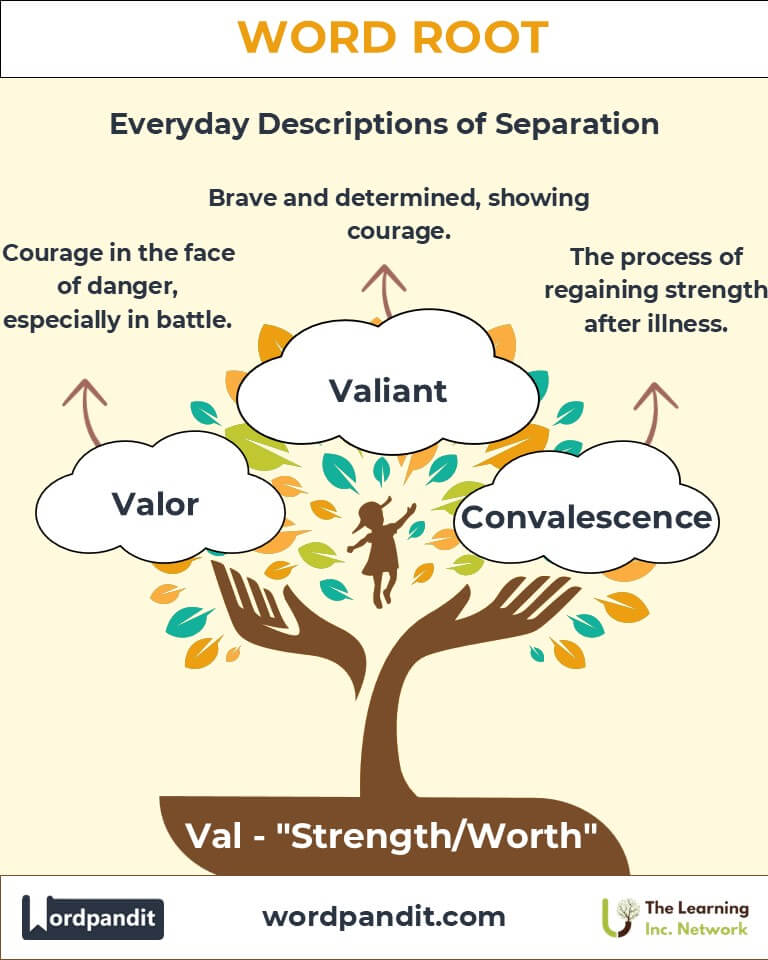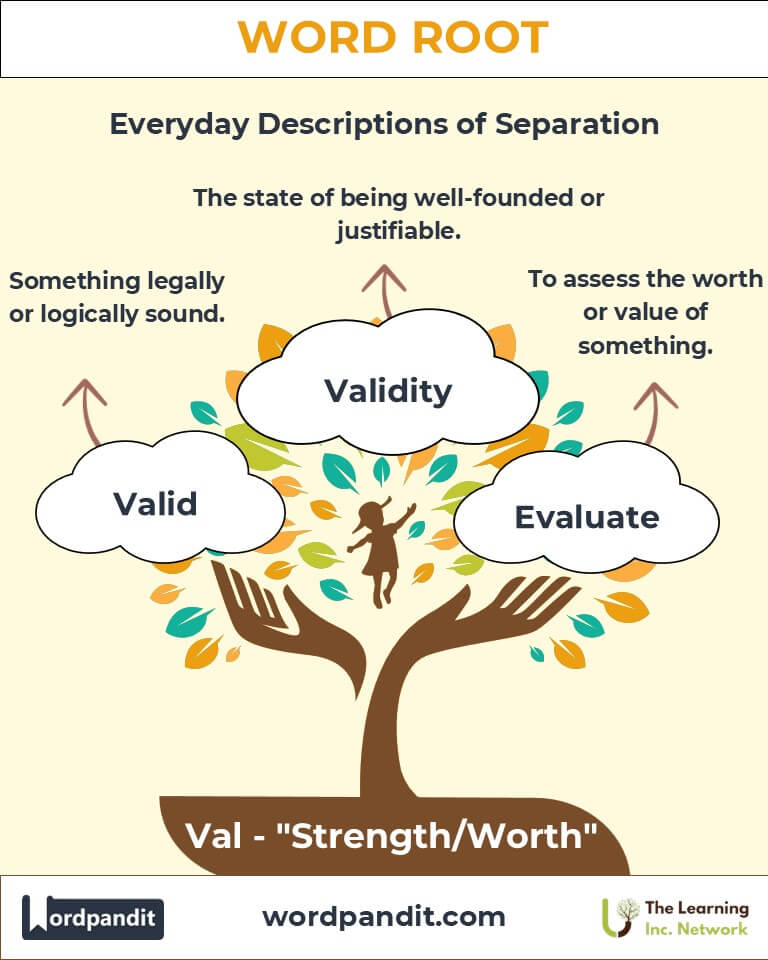Val: The Root of Strength in Language and Life
Discover the dynamic essence of the root "Val," derived from Latin, meaning "strength" or "worth." From everyday words like "valid" to inspiring terms like "valor," this root underscores the concepts of power, resilience, and value that shape human experiences across diverse fields.

Table of Contents
- Introduction: The Strength of Val
- Etymology and Historical Journey
- Mnemonic: Unlocking the Power of Val
- Common Val-Related Terms
- Val Through Time
- Val in Specialized Fields
- Illustrative Story: Val in Action
- Cultural Significance of Val
- The Val Family Tree
- FAQs About the Val Word Root
- Test Your Knowledge: Val Word Root Quiz
- Conclusion: The Living Legacy of Val
Introduction: The Strength of Val
What gives something its value or validates a person’s bravery? The root val, pronounced “val,” encapsulates the concepts of strength, worth, and power. Derived from the Latin "valere," meaning "to be strong," this root appears in words that evoke courage, resilience, and authenticity. From valor on the battlefield to validity in logic, the "val" root strengthens language and empowers meaning.

Etymology and Historical Journey
The word root val traces its origins to Latin, specifically the verb "valere," meaning "to be strong or worthy." Over centuries, this root found its way into French as "valoir" (to be worth) and then into Middle English, where it began appearing in terms like "value" and "validity." With time, it broadened to include both literal and metaphorical applications, symbolizing not only physical strength but also moral and intellectual worth.
Mnemonic: Unlocking the Power of Val
Picture a knight holding a shining shield with "VAL" engraved on it, symbolizing strength and courage. This knight stands firm against challenges, embodying the idea of being worthy and strong.
Mnemonic Device: "VAL is the knight of strength, defending worth with valor and validity."
Common Val-Related Terms
- Valid (VAL-id): Something legally or logically sound.
Example: "The scientist’s argument was valid, backed by solid evidence." - Valor (VAL-or): Courage in the face of danger, especially in battle.
Example: "The soldier’s valor was celebrated in a moving ceremony." - Evaluate (ee-VAL-yoo-ate): To assess the worth or value of something.
Example: "The teacher asked the students to evaluate the impact of climate change." - Valiant (VAL-yuhnt): Brave and determined, showing courage.
Example: "The valiant firefighter saved several lives during the rescue." - Validity (va-LID-i-tee): The state of being well-founded or justifiable.
Example: "The validity of the experiment was confirmed by consistent results."
Val Through Time
- Valiant (Medieval Usage): In Middle English, "valiant" described knights who demonstrated unwavering bravery. It evolved from the Latin "valere," emphasizing strength and worthiness in battle.
- Valid (Modern Usage): In modern contexts, "valid" extends beyond legality to encompass logical reasoning and authenticity, reflecting societal shifts toward intellectual rigor and evidence-based conclusions.
Val in Specialized Fields
- Law: Validity ensures the soundness of legal contracts.
Example: "Without signatures, the agreement lacks validity." - Philosophy: Evaluate is used to determine the ethical or logical worth of an argument.
Example: "Philosophers evaluate theories to uncover universal truths." - Medicine: Convalescence describes the period of regaining strength after illness.
Example: "Her convalescence was aided by a nutritious diet and rest." - Economics: Value determines the worth of goods and services in a market.
Example: "The value of real estate has increased significantly over the past decade."
Illustrative Story: Val in Action
During a fierce storm, a valiant sailor named Marco took command of a struggling ship. The crew, frightened by the towering waves, questioned the validity of their survival plan. Marco, relying on his strength and quick thinking, evaluated the situation and guided the ship to calmer waters. His valor and decisive actions earned him the admiration of his crew, proving the enduring worth of courage and resilience.
Cultural Significance of Val
The root val symbolizes strength across cultures and disciplines. In literature, characters like King Arthur demonstrate valor, inspiring readers with their bravery. Philosophically, "val" reflects the inherent worth of individuals and ideas. Whether in epic tales or everyday expressions, this root connects us to timeless ideals of strength and authenticity.

The Val Family Tree
- Vale (Latin): Goodbye or farewell.
Example: "Vale" symbolizes strength in parting. - Validus (Latin): Strong.
Example: "Valid" stems from this powerful origin. - Virtus (Latin): Courage and character.
Example: "Virtue" is often linked to valor.

FAQs About " Val "
Q: What does "Val" mean?
A: The root "val" means "strength" or "worth." It originates from the Latin word "valere," which translates to "to be strong" or "to be worthy." Words derived from this root often convey ideas of power, value, and validity.
Q: What is the difference between "Valid" and "Validity"?
A: "Valid" is an adjective describing something that is legally or logically sound, such as a valid argument or a valid passport. "Validity," on the other hand, is a noun that refers to the state or quality of being valid. For example, the validity of a claim refers to whether it holds true under scrutiny.
Q: How is "Valor" different from "Valiant"?
A: "Valor" is a noun that represents courage and bravery, often in dangerous or challenging situations, like on the battlefield. "Valiant," an adjective, describes someone or something that shows this bravery or determination. For instance, a "valiant knight" exhibits valor.
Q: What does "Evaluate" mean, and how is it connected to "Val"?
A: "Evaluate" means to determine the worth or significance of something. It is directly connected to "val" because it involves assessing value. For example, when you evaluate a project, you are judging its worth based on specific criteria.
Q: What does "Convalescence" mean, and why is it related to "Val"?
A: "Convalescence" refers to the period of recovery after an illness or injury. The connection to "val" lies in the restoration of strength. The term suggests regaining the physical and mental fortitude lost during sickness.
Test Your Knowledge: " Val " Mastery Quiz
1. What does "Val" mean?
2. Which word describes bravery in battle?
3. What does "Evaluate" mean?
4. What is the meaning of "Convalescence"?
5. Which term refers to logical soundness?
Conclusion: The Living Legacy of Val
The root val enriches our language with terms that reflect strength, worth, and resilience. From valor in stories to validity in arguments, it underscores the importance of integrity and courage. As new words emerge, the enduring legacy of val continues to inspire and empower, reminding us of the universal value of strength in all its forms.












